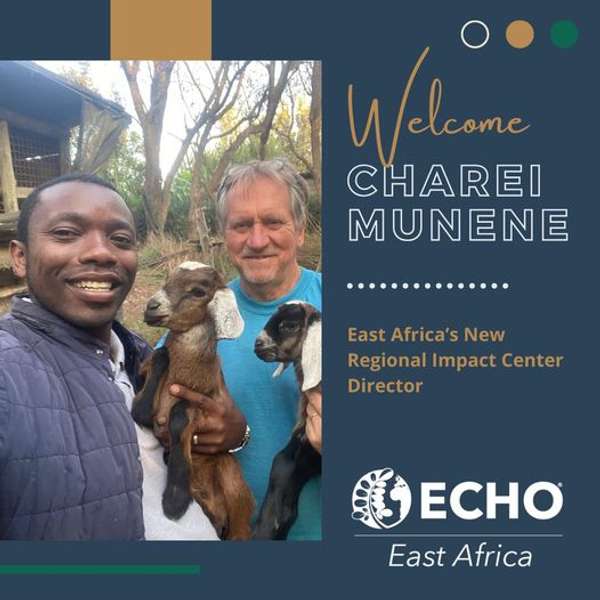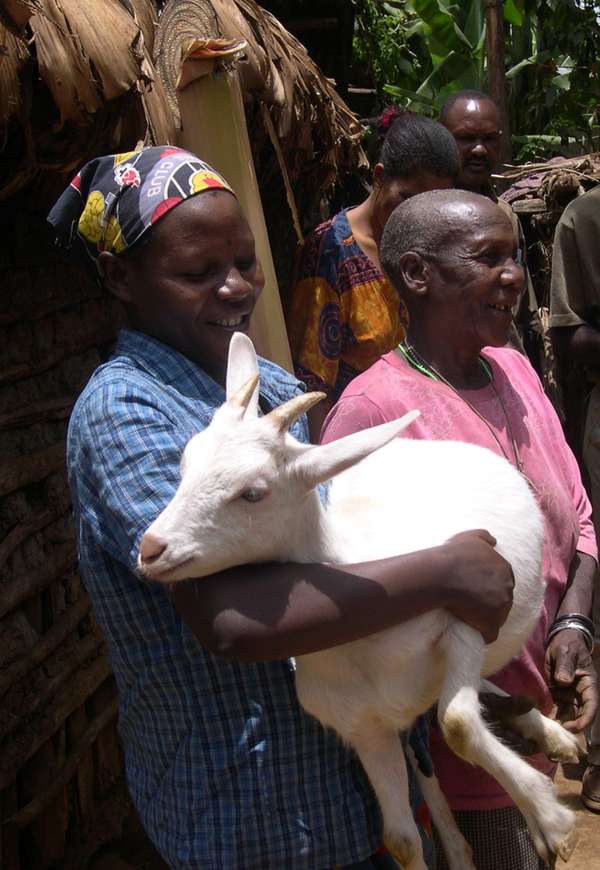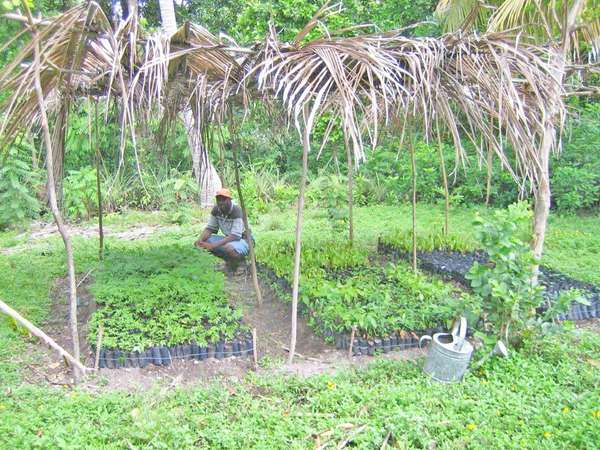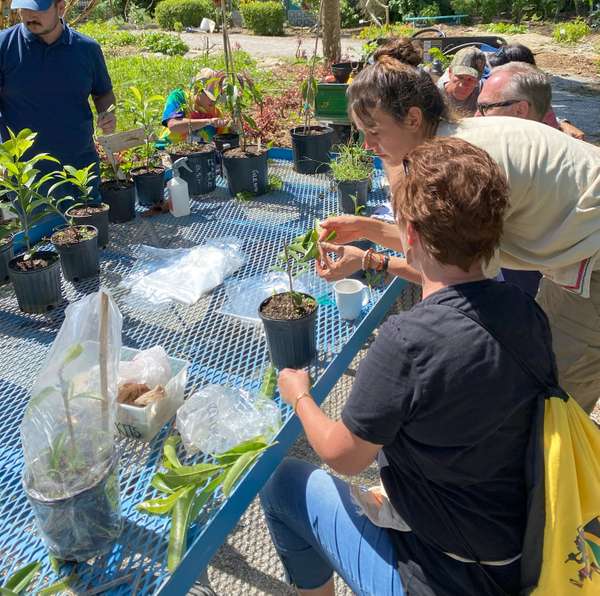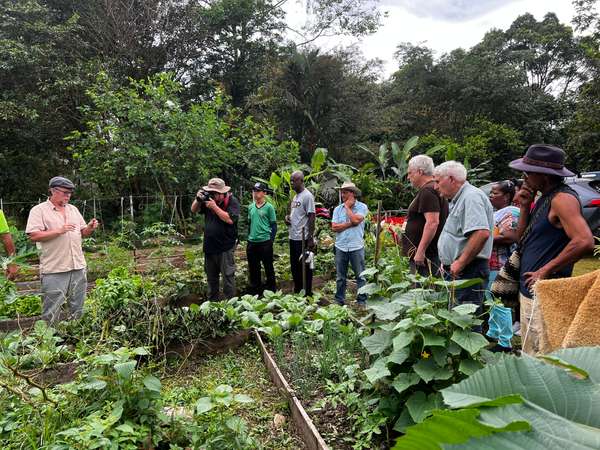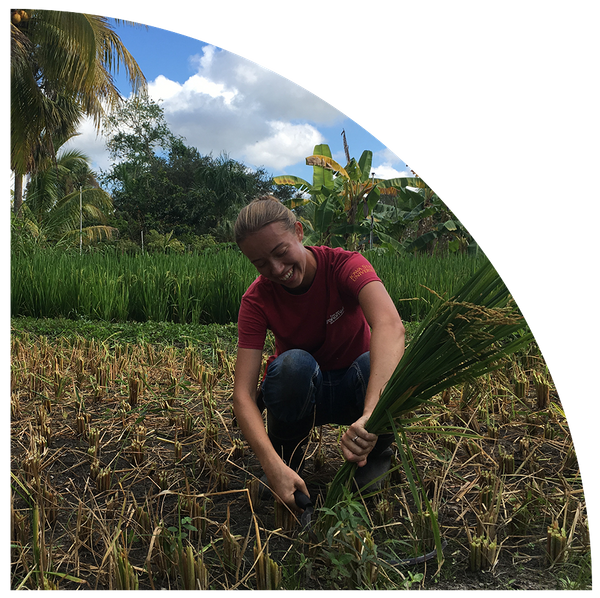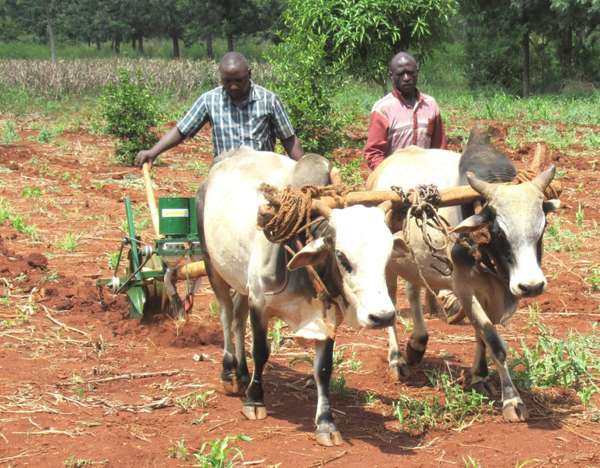ECHOcommunity Actualizaciones
Welcome Charei Muene, ECHO East Africa Regional Impact Center Director 2024-11-19
ECHO is excited to announce that Mr. Charei Munene has joined us as our new ECHO East Africa Regional Impact Center Director. Charei is a passionate advocate for farmers and a leader in Agroecology and Ecological Organic Agriculture, bringing over 10 years of experience in the African agricultural landscape. Our outgoing East Africa Director, Mr. Erwin Kinsey, will be working alongside Charei and transitioning out in the months to come.
We feel very blessed to work alongside these diligent workers. Please join us in welcoming Charei to the ECHO team!
Best Practice Note 9: Livestock Projects Now Available! 2024-11-12
This ECHO Best Practice Note distills insights from farmers and other specialists who collaborated in promoting livestock as a means to improve rural livelihoods. The author’s experience affirms that livestock are indeed a beneficial part of most agricultural systems, contrary to some modern theories of their obsolescence. I am not referring here to factory-farming but rather to animal raising by smallholder farmers and small-herd pastoralism. Livestock keeping by smallholder farmers and pastoralists, though very different, generally can add value, nutrition, and income diversification to low-income homesteads as well as bolster a viable rural credit program. Passing female offspring on to other resource-limited families, with good local supervision in the selection and preparation of the recipients, has proven successful and creates a local livestock production system.
Excerpt:
Livestock projects are an impetus for introducing environmentally sound farming practices like agroforestry, zero-grazing, proper soil and water conservation, and adoption of animal-friendly practices like provision of feed and water, regular veterinary services, improved breeding initiatives like artificial insemination, and local vaccination programs. East Coast Fever vaccination in cattle and Newcastle disease control in chickens are vital to thriving livestock programs. In the case of Newcastle disease control, developing a sustainable vaccination service by farmers themselves is important because services are too cumbersome for the government to provide countrywide.
Resource Highlight: World Agroforestry Center Nursery Management Manual 2024-11-09
As ECHO technical staff answer questions from the ECHO network, about tree nursery managment one resource stands out among the rest. In 2013 the World Agroforestry Center's published "Nursery management, tree propagation, and markeeting strategy: a training manual for smallholder farmers and nursery operators" which is a detailed and relevant publication specific to smallholder contexts. It has key insights into developing economically viable plans for nurseries and contains best practices that ECHO nurseries use around the world at our various Regional Impact Centers. If you are thinking of starting a nursery or want to improve one you already have, our staff encourage you to look into this vaulable resource.
To view, click here then select "View source"
Don't miss out! Post-Conference Workshops Friday, November 15th 2024-11-02
Friday, November 15th | North Fort Myers, FL
Don't miss out on practical hands-on training the day after the ECHO International Agriculture Conference on the Research and Demonstration Farm. This year, ECHO North America is offering 3 different Post-Conference workshops:
- Cultivate Abundance, Mision Peniel, & ECHO grow, collect, & share nutritious, culturally preferred food for the Immokalee farm worker community. Participants will visit Mision Peniel to see the garden and preparations that go into serving their community.
- The Propagation post-conference workshop will cover topics such as nursery management skills, creating potting mixes, & propagation methods (seed germination, cuttings, division, air layering & grafting). Participants will get hands-on experience grafting.
- Earthen construction holds many advantages over conventional building methods: fire resistance, temperature control, and minimal impact on the environment. A critical advantage is the low cost! This post-conference workshop will cover theory, design, and hands-on practice.
Transportation to/from Hotel and lunch are included.
Scroll down to "Add-on" and select the specific Post-Conference Workshop you'd like to attend!
Add on a Post-Conference Workshop to your Registration!
Capacitación de SIFAT 2024-11-02
Del 20 al 26 de septiembre, Servants In Faith and Technology (SIFAT; sifat.org/) realizó una capacitación sobre Seguridad Alimentaria y Agroecología en su finca de demostración en La Tigra, San Carlos, Costa Rica. Participantes de Honduras, Guatemala, Nicaragua, Costa Rica, y Haití comenzaron juntos cada día con una oración y meditación. Los temas de desarrollo comunitario incluyeron capacitaciones prácticas en la finca y visitas.
Las prácticas agroecológicas típicas en la finca de demostración de SIFAT trataron sobre agentes biológicos para control de plagas y mejoras del suelo como “microorganismos de montaña” y biocarbón. Los experimentos en finca por la Universidad Nacional de Agricultura de Honduras mostraron la aplicación en el terreno de estas prácticas al tiempo que caracterizan su papel en la agroecología de las fincas locales.
La capacitación sobre reforestación y manejo de viveros, con varias generaciones participando en el programa la Abuela Ecológica mostró la siembra de árboles eficaz e inclusiva en Costa Rica. Este programa [http://edn.link/9h4drt] mostró la importancia de todas las generaciones trabajando juntas. El emprendedurismo en fincas pequeñas puso de relieve las preocupaciones de cooperativas de mujeres exitosas y empresas familiares así como la educación ambiental. El Ministerio de Agricultura de Costa Rica recordó a los asistentes el papel positive que los gobiernos desempeñan con el medio ambiente y la paz como prioridades. Presentaciones especiales de “Development is from the Heart” (El Desarrollo viene del corazón) de Nicaragua y las experiencias de SIFAT Haití animaron a los participantes. El contenido del evento no solo cubrió la producción agrícola orgánica sino también respuestas nutricionales sencillas al hambre a través de talleres sobre verduras de hoja verde, como una clase sobre la preparación de la espinaca brasileña.
SIFAT está construyendo un centro de Tecnología Apropiada para ampliar la capacitación en América Latina y el Caribe. Fueron momentos gratificantes de compañerismo, oración y pertenencia a un grupo diverso de personas, siempre recordando a los 13,400 niños menores de cinco años que mueren diariamente por causas relacionadas con el hambre (UNIGME, 2024).
Referencia
Grupo Interinstitucional de Estimaciones sobre la Mortalidad Infantil de Naciones Unidas. 2024. Estimaciones (UNIGME), niveles & tendencias en la mortalidad infantil: Informe 2023. Fondo de las Naciones Unidas para la Infancia. Nueva York, EE. UU.
ECHO South Asia Commencement Event in India 2024-10-29
November 1, 2024 | 5-9 PM
Heinz Auditorium, New Delhi
Please join us in celebrating the launch of ECHO South Asia! ECHO's new South Asia Regional Team is led by Gladstone Kumar. Gladstone is originally from southern India. Please join us if you are able at the Heinz Auditorium, YMCA in New Delhi. We hope to see you there!
2025-2026 Internship Application Now Open! 2024-10-22
ECHO North America is now accepting internship application for the 2025-2026 Internship Program!
- Applications open October 16, 2024
- Application due by January 20, 2025
- Interviews are conducted in January 2025
- Internships are assigned in February 2025
- Internship begins May 28, 2025
Internship Description
ECHO interns receive academic and hands-on training at ECHO's Small Farm Resource Center learning from experienced farm, seed bank, propagation, appropriate technology, animal specialist, and community development staff. At the end of this 11-month internship, interns will receive a certificate in Tropical Agriculture Development and gain valuable hands-on experience in growing tropical foods, creating trainings in agriculture or community development, harvesting, cleaning and processing seeds, supervising the work of local volunteers, learning to care for livestock, and maining various farming demonstrations.
Maresha Plow - ECHO Technical Note #102 Now Available 2024-10-15
ECHO's latest Technical Note is the owner's manual for the Maresha Plow! ECHO East Africa worked with Neil Rowe-Miller from 2018-2023 to develop and refine the Maresha plow, originally from Ethiopia, into a seeder for promotion of conservation agriculture in East Africa. This Technical Note includes details about the plow's benefits, parts, operation, calibration, trouble-shooting, maintenance, repairs, and economic considerations.
Download Technical Note 102: Maresha Plow
EXCERPT:
The maresha planter is fitted with two independent seed meters. Each of these meters has one compartment with large holes (flutes) and one compartment with small holes (flutes). Depending on which compartments you use, you can apply seed and fertilizer at the same time, or you can plant two different types of seed in alternating rows. Large flutes are used for large-seeded crops (maize, beans, groundnuts, etc.). Small flutes are used for fertilizer or small-seeded crops (sorghum, millet, small-seeded cowpea, etc.).
Speaker Highlight: Robert Morris/Registration Closing Soon 2024-10-08
Robert Morris
Senior Manager for Program Innovation, HOPE International
Robert Morris serves as the Senior Manager for Program Innovation at HOPE International. In his role, he works alongside their global team to develop creative strategies and solutions to pressing and complex challenges in their network. In 2020, Robert led the launch of HOPE International’s first regenerative agricultural trainings through savings groups and since then, more than 25,000 farmers in 6 countries have been trained to apply regenerative farming principles alongside saving and borrowing from their groups. Robert is passionate about the intersection of faith, business, and development work and how we can harness agriculture as a tool to share the Gospel.
Presentation Title: Growing your garden together: How savings and agriculture can combine to multiply impact
November 12-14 | Fort Myers, FL
Registration for conference closes October 19th!
Book your hotel room by October 18th for the group rate!
อาหารเสริมสำหรับโคนมที่ได้จากเปลือกหุ้มผลชั้นในของเมล็ดกาแฟ 2024-10-03
บทความนี้เป็นการสรุปการวิจัยที่จัดทำโดยเจ้าหน้าทีเอคโค่ เอเชีย ที่ฟาร์มโคนม MMM การวิจัยมีจุดมุ่งหมายเพื่อใช้เปลือกหุ้มผลชั้นในของเมล็ดกาแฟที่ได้มาโดยไม่ต้องเสียค่าใช้จ่ายมาทดแทนกากใยที่ต้องซื้อมาเป็นส่วนประกอบในอาหารโคนม รวมถึงเพื่อประเมินผลที่ได้ต่อการผลิตน้ำนม
ขั้นตอนสุดท้ายในการแปรรูปเมล็ดกาแฟดิบ (Coffea arabica) คือการกำจัดเปลือกที่เป็นผนังผลชั้นในของเมล็ดกาแฟ ซึ่งมักเรียกกันว่า "กะลา" ศูนย์แปรรูปกาแฟต่างๆจะทำการกำจัดเปลือกชั้นในออกก่อนที่จะขนส่งหรือก่อนการคั่วเมล็ดกาแฟ ทำให้มีของเสียที่ไม่ต้องการสะสมอยู่ วิธีการกำจัดเปลือกชั้นในได้แก่ การเผาหรือทิ้งไว้เป็นกองเพื่อให้ย่อยสลาย ซึ่งทั้งสองวิธีนี้อาจเป็นอันตรายต่อสิ่งแวดล้อมได้หากมีในปริมาณมาก
